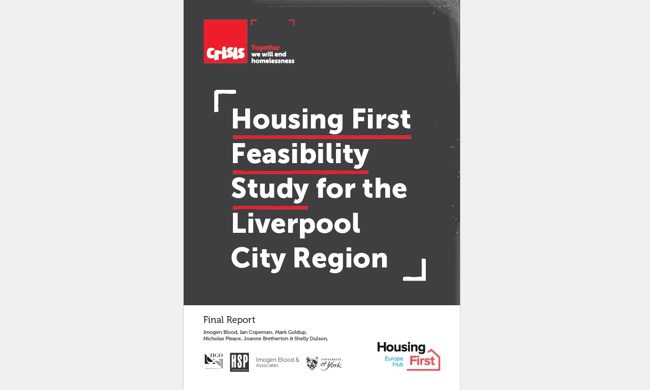Housing First Feasibility Study for Liverpool City Region (2017)
11.07.2017
The study aimed to test the feasibility of implementing Housing First at scale within the Liverpool City Region (LCR). It was commissioned by Crisis, with funding from the (UK Government) Department for Communities and Local Government and the Housing First Europe Hub. It was conducted by a consortium led by Imogen Blood & Associates and including Housing & Support Partnership, HGO Consultancy, and the Centre for Housing Policy (University of York).
Key findings
- Data from the Mainstay database in LCR identifies that there are 1,511 units of accommodation based supported housing for people who are homeless across the LCR (2016/17). The amount and type of commissioned supported housing and the extent to which this is integrated within a wider system of prevention, outreach and floating support varies significantly by local authority.
- There is high demand and unmet need in relation to homelessness services, the data from LCR suggests that the current supported accommodation system is supporting some people out of homelessness and into more settled housing; but that these constitute a minority.
- The study found a high degree of consensus that the current homelessness system is not working well, despite the best efforts of many individuals working in homelessness services. Professionals and people with lived experience highlighted a number of ways in which current accommodation can be unsuitable for people with complex needs.
- People with lived experience of homelessness told us they thought that support to help people exit homelessness should include: i) emotional support; ii) peer support; iii) independence; iv) not being judged; v) opportunities for rehabilitation and longer term planning; vi) structure and purpose; vii) a focus on social integration; viii) a swift and flexible response to people with addictions who are at the right stage in the cycle of motivation
- By providing a stable independent tenancy (i.e. your own front door) and holistic personalised support, Housing First aligns well with this list of priorities. By dispersing people within the community, it aims to (re-)integrate homeless people into ‘normal’ life. Most importantly, since it is not conditional on abstinence or receiving treatment, it treats homeless people like adult citizens with strengths, rights and responsibilities.
- It became clear during the course of the research that whilst Housing First will have clear benefits for some people experiencing homelessness in the LCR, what is equally as pressing is wider housing led system reform for the prevention of homelessness. Without being integrated as a mainstream approach, funding will be precarious; for Housing First to be sustainable in the current financial climate, it needs to be done at a scale and in a way that enables the safe transfer of resources to it from current support commissioning.
- Developing Housing First ‘at scale’ will require: determined partnership working; the implementation of new models of service delivery and, crucially, a very real change in the culture of services if it is to succeed in creating a rights-based, non- judgmental, strengths-based approach that emphasises citizenship and builds resilience.
- We ran two scenarios to look at the potential for cash savings for local authority-commissioned support in LCR:
- A conservative scenario, in which Housing First runs alongside reduced but still significant provision of supported housing, with estimated cost savings of £1.18m; and
- A more ambitious scenario, in which most 24/7 supported housing is replaced by Housing First, with estimated cost savings of £4.02m
- The wider system within which Housing First should be integrated needs to include:
- A consistent approach to accessing mainstream housing for those experiencing or threatened with homelessness: we suggest this might be through a local lettings approach, however, a wider review of allocations policies in the region will also be needed;
- Significant investment in prevention services, which meet the requirements of the Homelessness Reduction Act and are inclusive of all those experiencing or threatened with homelessness, regardless of legal status; Sustained or renewed investment in floating support services, which fit with the basic principles of Housing First in terms of ethos and approach;
- The development of clear pathways between the criminal justice system, NHS provision and the system for preventing and responding to homelessness.
Reference
Blood, I., Copeman, I., Goldup, M., Pleace, N., Bretherton, J. & Dulson, S. (2017) Housing First Feasibility Study for the Liverpool City Region, London: Crisis.

